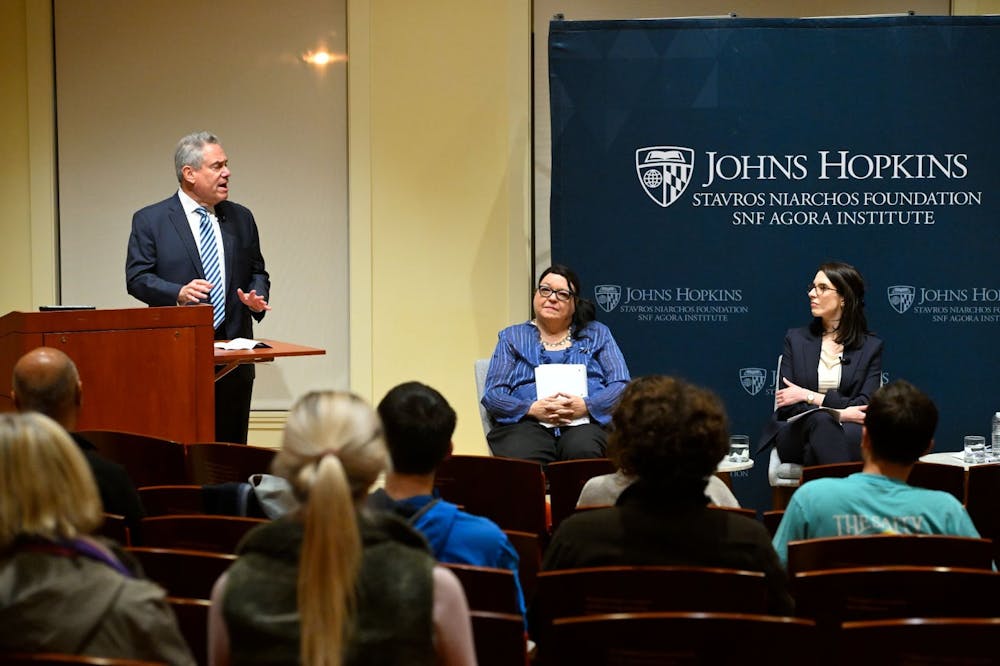The Stavros Niarchos Foundation (SNF) Agora Institute hosted a debate on Nov. 29 between two legal experts over the most effective way to hold former President Donald Trump accountable for his role in the Jan. 6 insurrection.
Ronald Weich, dean of the University of Baltimore School of Law, defended the position that Trump should not be issued a criminal referral. Lisa Graves, executive director of True North Research, a progressive watchdog group, argued against it.
Although the House of Representative’s committee concluded that there is substantial evidence to warrant a criminal referral, a referral is not necessary for the Department of Justice (DOJ) to prosecute the former president.
In his opening statement, Weich argued that making a referral might actually work against the committee’s goal of accountability.
“What I'm concerned about is that it doesn't accomplish anything to send... a formal [referral] to the Justice Department, and it has the downside of providing a political tint to the matter,” he said.
Weich explained that Merrick Garland, the U.S. attorney general, needs to ensure that the DOJ is viewed as making decisions solely on the basis of the facts and the law. He noted that if the DOJ criminally prosecutes Trump after receiving a referral from the committee, it might be perceived as acting at the behest of the Democratic Party.
In Graves’ subsequent opening, she argued that because a referral would not force the DOJ to prosecute, making one would not hurt the chances of a criminal prosecution taking place. She further asserted that the investigations into Trump have already been called partisan, making Weich’s concern unwarranted.
“In this instance I feel like there's a moral imperative for Congress... to see [this investigation] through and to not be cowed [by] the notion that they will be smeared or that they will make Merrick Garland's job more difficult,” she said.
In his rebuttal, Weich expressed that he felt the committee had already satisfied its moral obligation by compiling a wealth of evidence for the DOJ to draw upon. Further, he explained that multiple investigations into Trump’s actions are already underway, which create other avenues for accountability for the former president’s actions to be sought.
“There are other cases in which former President Trump is under investigation — the Mar-a-Lago documents... the Stormy Daniels prosecution,” he said. “And then remember that the midterm election was... really a personal repudiation of President Trump. Has he already been held accountable by the voters of this country?”
Weich referred to section three of the 14th amendment, which bars previous office-holders who have supported an insurrection from holding office again, as another avenue to accountability.
In her own rebuttal, Graves agreed that although several viable avenues to accountability already exist, all avenues should still be pursued.
“We need to make sure that we are not taking options off the table in terms of holding the people responsible for this assault on our democracy... accountable in every way possible, including through a criminal referral by Congress,“ she said.
In an interview with The News-Letter, Parsa Farhang, a second-year doctoral student, expressed being heartened by the nature of the discourse between Weich and Graves.
“The exchange of ideas was very respectful,” he said. “They were actually having a spirited exchange of ideas, and you could kind of see them molding to each other’s ideas ever so slightly. It allowed me to be engaged as an audience member.”
After the rebuttals, Louise Flavahan, director of dialogue and debate at the SNF Agora Institute and the moderator of the event, asked a few questions to each debate partner in rapid-fire Q&A style.
Flavahan questioned Weich on why Trump should be held to a different standard given that the House has already set criminal referals to the DOJ for Steve Bannon, Peter Navarro, Dan Scavino and Mark Meadows.
Weich answered that the referrals from the House were specific to the congressional progress or were contemptuous of congressional subpoenas legal process, which would be different from the referral for Trump.
“The Trump referral would be more open ended and might involve some serious crime, such as support units or insurrection,“ he said. “That seems to me to be beyond the scope of Congress's role.”
Flavahan also raised a question regarding the separation of powers to both debaters. Specifically, she questioned if the Jan. 6 committee has an avenue to offer recommendations related to the Supreme Court.
Graves stated that while she believes there are problems with the Supreme Court, specifically the lack of a binding ethical code and a lack of judicial code applicable to all other judges, circuit judges and district court judges, she does not think the Jan. 6 committee can make recommendations to the court.
The last half an hour was then devoted to an audience Q&A.

















